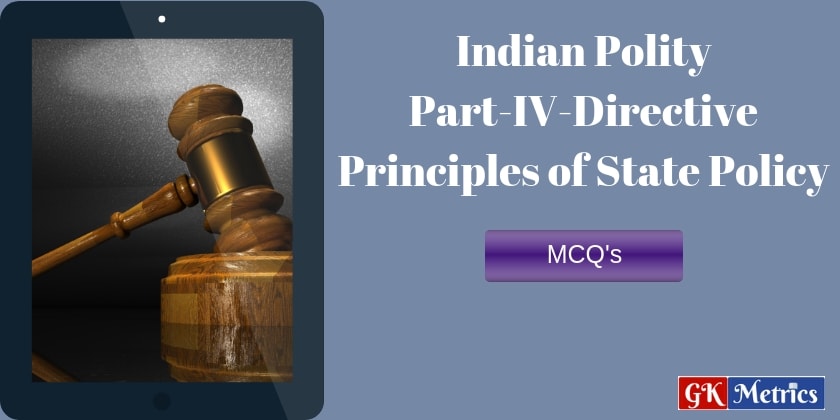Directive Principles of State Policy
Directive Principles of State Policy has been mentioned in Part-4 of the Constitution between 36 – 51. They were taken from the Constitution of Ireland created in 1937.
State policy directors can be divided into three parts depending on their nature.
1. Socialist theory
2. Gandhian theory
3. Liberal intellectual theory
1. Article 36 – definition of state
2. Article 37 – State Policy Director can not be enforced by the court due to the violation of the elements.
Socialist theory:
3. Article 38 – Provides social, economic and political justice for the promotion of public welfare.
4. Article 39 – Ownership and Control of Physical Resources
5. Article 39A -Providing equal justice and free legal aid.
6. Article 41 – preserves the right to get work, education and public assistance in some situations.
7. Article 42 – Provision of the fair and human conditions of work.
8. Article 43 – subsistence wages for the workers.
9. Article 43A -Participation of workers in the management of industries.
10.Article 47 – Nutritional levels and quality of life
Gandhian theory : These principles are based on Gandhian ideology, their goal is to incorporate some of their ideas into policy-director elements to realize the dreams of Gandhiji.
11. Article 40 – Formation of Gram Panchayats which give them the power to work in the form of units of autonomous rule.
12. Article 43 – Promotion of small industries on the basis of personal or cooperative in rural areas.
13. Article 43B- Participation of workers in the management of industries.
14. Article 48 – Incentives to improve the breed of cow, calf and other milch animals and prevention of slaughter.
Liberal intellectual theory:
15. Article 44 – Uniform Civil Code.
16. Article 45 – Free and compulsory education provision for students and students of 6-14 year olds.
17. Article 48 – Encourage agriculture and animal husbandry from the modern scientific system.
18. Article 48A- Protecting the environment, forests and wildlife.
19. Article 51 – Enhance international peace and security and maintain a fair and respectful relationship between the nations.
Part IV-Directive Principles of State Policy MCQ’s
1. Which of the following are Gandhian Directive Principles?
1) To organize village panchayats
2) To secure opportunities for healthy development of children
3) To promote cottage industries
a. 2, 3
b. 1, 2
c. 1, 3
d. All of the above
[toggle] Answer – C [/toggle]
2. Which of the following Directive Principles were added later?
1) Promote the educational and economic interests of SCs, STs, etc.
2) Minimize inequalities in income.
3) Secure the participation of workers in the management.
a. 2, 3
b. 1, 2
c. 1,3
d. All the above
[toggle] Answer – A [/toggle]
3. Which of the following is/are true regarding Directive Principles of State Policy?
1) DPSPs are not automatically enforced.
2) Court can uphold the validity of a law on the ground that it was enacted to give effect to a DPSP.
a. Only 1
b. Only 2
c. Both 1 and 2
d. All of the above
[toggle] Answer – C [/toggle]
4. Which of the following are criticisms of Directive Principles of State Policy (DPSPs)?
1) Does not speak of welfare state
2) Illogically Arranged
3) Conservative
4) Need more principles
a. 1, 2, 3
b. 1, 4
c. 2, 3
d. All of the above
[toggle] Answer – C [/toggle]
5. Which of the following examples of implementation of Directive Principles?
1) Planning Commission
2) Wildlife (Protection) Act, 1972
3) 73rd Amendment Act of 1992
4) Minimum Wages Act
a. 1, 2, 4
b. 1, 3
c. 2, 3, 4
d. All of the above
[toggle] Answer – D [/toggle]
6. The purpose of Directive Principles of State Policy is to?
A. lay down positive instructions which would guide State policy at all levels.
B. implement Ganhiji’s idea for a decentralized state.
C. check the use of arbitrary powers by the government.
D. promote welfare of the backward section of the society.
[toggle] Answer – A [/toggle]
7. Which part of the Indian Constitution deals with the Directive Principles of State Policy?
A. Part III
B. Part IV
C. Part V
D. Part VI
[toggle] Answer – B [/toggle]
8. The enforcement of Directive Principles depends most on?
A. the President
B. the Court
C. resources available to the government
D. Chief Justice of India
[toggle] Answer – C [/toggle]
9. One of the objectives of Directive Principles of State Policy is?
A. total prohibition
B. prevention of gambling and lotteries.
C. making effective provisions for securing the right to work, education and public assistance in case of unemployment, old age, sickness and disablement.
D. all of these
[toggle] Answer – C [/toggle]
10. Separation of the judiciary from the executive has been provided in one of the following parts of the Indian constitution?
A. The preamble
B. The fundamental right
C. The directive principle of state policy
D. The Seventh Schedule
[toggle] Answer – C [/toggle]

